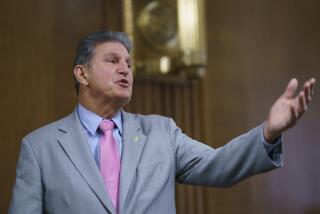COLUMN RIGHT : Washington Belongs to All of Us : The District of Columbia would gain little from statehood; the country would lose a lot.
- Share via
Statehood is an issue of great absorption in the District of Columbia. Washingtonians claim that the nation’s capital is America’s last colony and suffers taxation without representation. Elsewhere, the suggestion elicits yawns.
Statehood is not a good idea. Washington is too small to have two senators, and has too narrow a social and political base to be a full-fledged state. Washingtonians already vote in presidential elections, and they take a lot more from the federal government than they pay in. They have home rule. If they want to vote in Senate elections on top of all that, let them rejoin Maryland, whence they came.
California has a vital interest in seeing that statehood for the district never comes to pass. Already Californians see their votes count for less than those of people in smaller states. Under the U.S. Constitution, each state gets two senators, regardless of size. Alaska’s 500,000 people, or Rhode Island’s 990,000, or Missouri’s 5.2 million all get the same say as California’s nearly 30 million.
Perhaps such a system made sense as a political necessity in 1789, when a way had to be found to unite 13 disparate colonies. But it doesn’t make any sense at all in 1990. If we make Washington a state, why not San Diego, which has more people, or Orange County, which has more territory, or the Bay Area, which has more diversity?
Why not make California 50 states and give it 100 senators, so it could have the same representation the District of Columbia says that it should get?
Statehood for Washington would just make these disparities worse by adding one more small state whose clout in the Senate would unfairly equal that of California and the other large states. Instead, we ought to be moving in the opposite direction, closer to the one-man, one-vote standard. Limiting the smaller states to one senator would be a good start.
As for complaints of taxation without representation, Washington’s current non-voting member in the House of Representatives could be given a vote. Since, by law, all revenue and taxation bills have to originate in the House, that should solve the problem.
Those complaints turn reality on its head, anyway. The District of Columbia takes far more from the federal government than it pays in. Billions of dollars are appropriated annually by Congress to pay for Washington’s parks, police and schools, in fact, its entire local government. Federal workers, tourists and the service industries they spawn contribute the local taxes that pay for other services.
Washington is a “colony” only in the sense that it receives a huge subsidy every year from the federal government. Just slap the word “national” on some civic improvement, and the rest of the country gets to pay for it. Washington has a very nice and very expensive subway system, for example, which all of us helped pay for. But when it comes to a subway in Los Angeles, which has more than three times metropolitan Washington’s population and a far greater need of mass transit, suddenly we’re largely on our own.
States are states because they cover the range of demography: They have both cities and farms, liberals and conservatives, rich and poor people of all races. Even Utah has a minority population, and heavily urbanized states like New York and Pennsylvania have rural areas. Washington has only itself: It is a small central city whose politicians’ concerns don’t extend far beyond urban minority issues. These have a right to be considered on the national agenda, and they are, but to have two senators from such a city-state would guarantee that their perspectives would be narrow and partisan.
Besides, Washington doesn’t just belong to the people who live there. It belongs to the whole nation. It is the federal city. If federalism is to have any meaning, the last thing anyone should want is the national capital acting just like any other state.
The only real change statehood would offer Washington would be Senate elections, and there is an answer for that. The district was carved out of Virginia and Maryland in a 10-mile-square diamond ceded by those two states almost 200 years ago. The Virginia half was given back later, when it was decided it wasn’t needed and the residents there wanted the vote. The Maryland side is what is left. It could be given back, too, with the federal government retaining jurisdiction over federal buildings and property.
Washington, Maryland. It has a ring to it.
More to Read
Get the L.A. Times Politics newsletter
Deeply reported insights into legislation, politics and policy from Sacramento, Washington and beyond. In your inbox twice per week.
You may occasionally receive promotional content from the Los Angeles Times.







